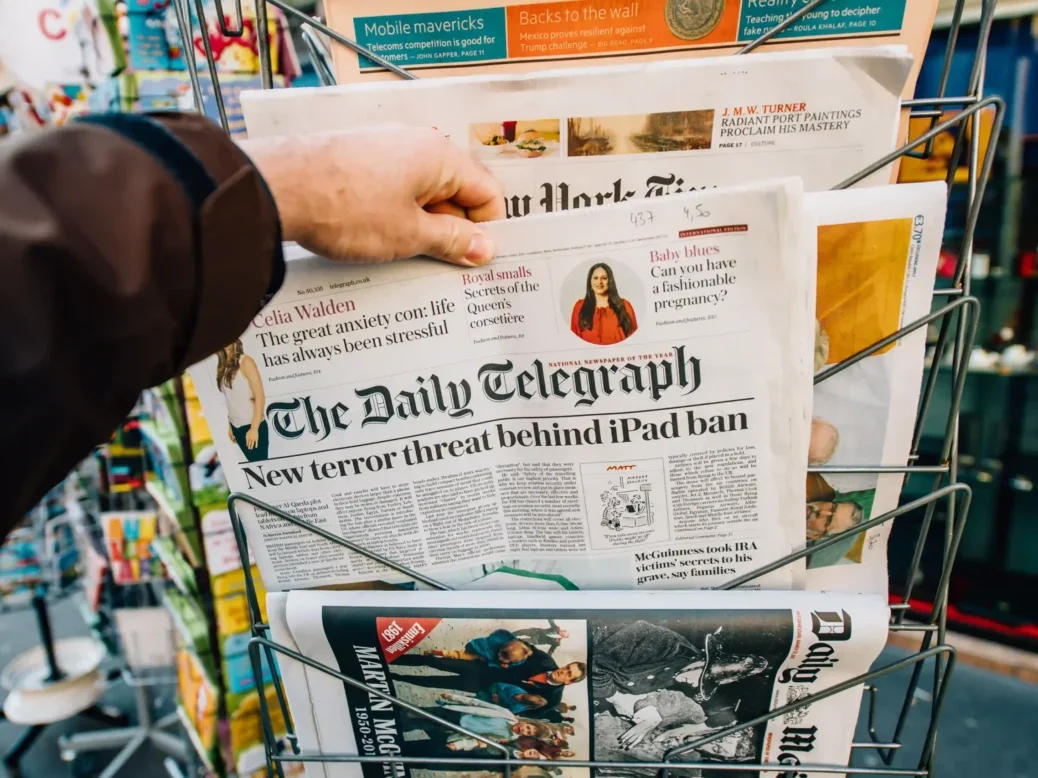
A bid to block foreign state-owned investors from holding a 15% stake in UK newspapers has been seen off by the Government with Tory frontbench backing.
An attempt by the Liberal Democrats in the House of Lords to prevent the threshold being raised from the previously proposed 5% was defeated by 267 votes to 155, majority 112.
But the move saw a significant Conservative rebellion, with 41 of the party’s peers defying the whip to back the so-called fatal motion.
Opponents of raising the foreign investment cap argued it would lead to undue influence and posed a direct threat to the freedom of the British press.
However, those in favour insisted it was needed to secure a vital funding stream and safeguard the future of media organisations.
The approval by the upper chamber of the change, already agreed by the Commons, paves the way for the takeover of The Telegraph after two years of uncertainty for the 170-year-old newspaper business.
A previous buyout was blocked by the then Tory government after introducing new rules to stop foreign state ownership of the press.
RedBird IMI, was majority-owned by Sheikh Mansour bin Zayed Al Nahyan, vice president of the United Arab Emirates.
Under a new deal struck earlier this year, RedBird Capital, the US junior partner in the investment fund, is seeking to buy a majority stake in the group for £500m.
Abu-Dhabi’s IMI will look to take a minority holding as part of the consortium of no more than 15%, in line with the new Government limit.
It is also understood that the Daily Mail and General Trust (DMGT) – which owns the Daily Mail, Mail on Sunday, the i Paper, and Metro – is also looking to buy a stake.
Media minister Baroness Twycross said the rules would only allow backing from state-owned investors such as sovereign wealth funds and pension schemes.
She told peers: “It does not apply to states themselves or other state bodies, so a foreign Government cannot buy and own a newspaper.”
She added: “The regulations include a strict requirement that the state-owned investor must hold the investment passively.
“They must have no right or abilities to appoint or fire directors or other officers, and they must have no ability to direct, control or influence a newspaper’s policy or activities.”
Proposing his fatal motion to the threshold change, Liberal Democrat Lord Fox said: “At the heart of the Government’s defence of these 15% ownership tranches is that the ownership will be passive. Traffic humps are passive, but they certainly change the way we drive.
“It seems that the minister’s view is that the investors will just sit back, not caring about the business and editorial direction their considerable investment will be taking. This is just not plausible.”
Tory former leader of the Lords peer Baroness Stowell of Beeston said: “The question I have grappled with is whether a 15% cap, restricted to passive investment only, still supports the much bigger principle of press freedom that we fought hard to protect.
“I have concluded that, with some safeguards, it does, and in reaching my view, I have not just considered what is best for the future of the Telegraph, I have very much taken account of how we need to safeguard the future of the whole news industry.
“Because, while we all care about protecting a free press, upholding that principle will serve little purpose if our news industry cannot survive, and its economic conditions are worsening.”
Former newspaper editor and independent crossbencher Baroness Boycott said: “I think that 15% passive ownership is perfectly okay.”
Deputy chairman of the Telegraph Group, and Conservative peer, Lord Black of Brentwood warned: “It really is five minutes to midnight for much of the British press. Today this House can either try to ameliorate the situation or condemn it to precipitate decline.
“The reason for that is simple. To survive in an intensely competitive global media marketplace, UK publishers need investment.”
He added: “State ownership of any form would be inimical to press freedom, but there is nothing wrong in a state actor having an ability to make a small, passive investment, carefully calibrated and restricted to ensure that it has no ability to influence editorial policy or restrict the freedom to report in any way.”
But Liberal Democrat Lord Clement-Jones said: “Even a 15% stake can provide extraordinary leverage, board representation, veto powers over key decisions and a very real influence over editorial policy.”
Conservative former Cabinet minister Lord Forsyth of Drumlean said: “This is about a general principle that foreign Governments could take a stake in our newspapers and other media assets.”
However, his party colleague Lord Udny-Lister said: “I cannot see any issue with this, for this is not a majority control nor is it a back-door granting of our press to be editorially censored by foreign state actors.”
Conservative peer Baroness Fleet, a former editor of the Evening Standard and deputy editor of the Telegraph and the Daily Mail, said: “To protect newspapers from any foreign state influence, I will support the fatal amendment.”
Email pged@pressgazette.co.uk to point out mistakes, provide story tips or send in a letter for publication on our "Letters Page" blog
